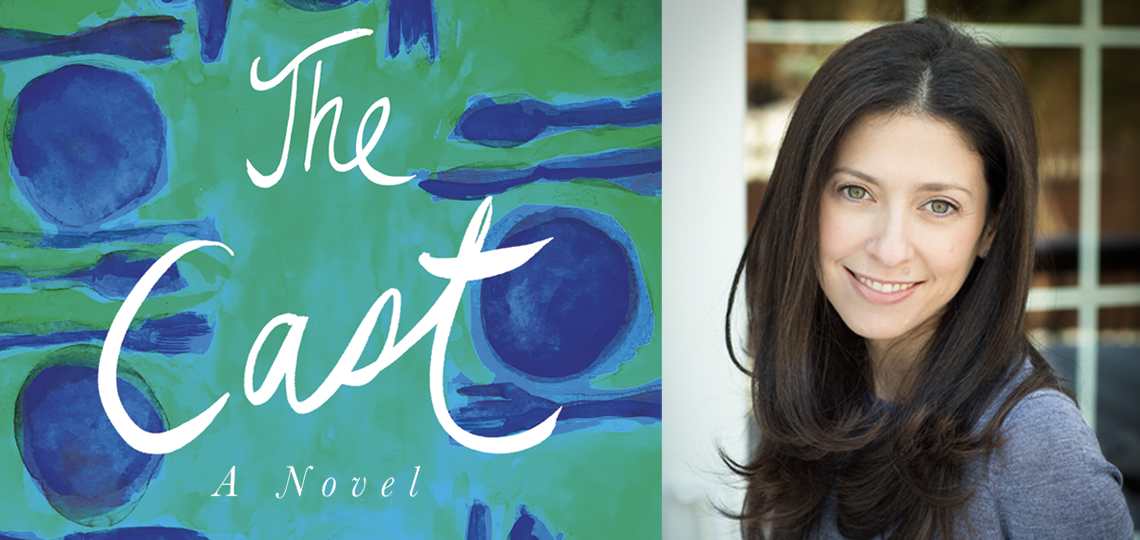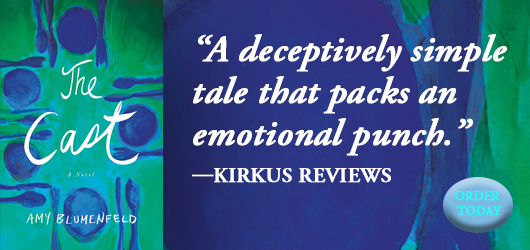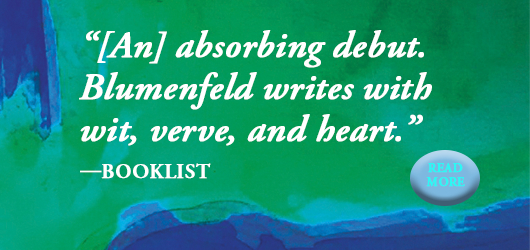Saturday Night Live meets The Big Chill in this award winning debut novel

Executive Editor Matt Sutherland Interviews Amy Blumenfeld, Author of The Cast
In journalist Amy Blumenfeld’s engrossing debut novel, The Cast, a group of lifelong friends gather for a reunion weekend that celebrates the triumph over a dark history—one that suddenly resurfaces and captures the depth and magic of decades-long bonds as these characters take stock of their lives, discover dormant passions, and endure unexpected, heartbreaking loss.
This revelatory story was inspired by the author’s graduate school master’s project about adult survivors of childhood cancer. A professor casually suggested she turn it into a book. Two decades later, it became this award-winning novel.
Foreword’s Executive Editor Matt Sutherland caught up with Amy to learn more.
As an accomplished professional writer of non-fiction, please talk about what drew you to fiction, and what you are compelled to explore as a novelist as it relates to The Cast?
It’s a bit of a story…
When I was in graduate school, I wrote my master’s project about adult survivors of childhood cancer. The professors instructed us to choose a topic that would sustain our interest over the course of a year. I had no idea what I would write about. I brainstormed countless ideas but nothing really stuck.
The day before the deadline for submitting our topic happened to be my annual checkup in the pediatrics department at Memorial Sloan Kettering Cancer Center. I was diagnosed with Hodgkin’s lymphoma when I was 13-years-old and had an autologous bone marrow transplant when I was 15. I have been vigilant about my follow up care ever since.
I checked in that morning at the front desk, got the paper ID bracelet, and sat down in the large waiting room with a notebook and pen scribbling down different master’s project ideas while I passed the time before meeting my doctor. The woman sitting beside me tapped my shoulder and asked if I was there waiting for a patient to come out of an appointment. I pulled up my sleeve and showed her the ID bracelet and said, “I’m the patient.” She was completely taken aback. She was there with her teenage daughter who had recently been diagnosed with another form of cancer and the mom began asking me numerous questions about my own experience, about my parents’ and brother’s experiences, and about my life during and post-treatment.
After my checkup, I found the woman and her daughter in the clinic and spent some time just hanging out with them. She thanked me for giving them hope and enabling them to see that there could be life after this nightmare. I left the hospital that afternoon and knew I had found my master’s project topic.
Over the next several months I interviewed doctors, psychologists, social workers, survivors and their loved ones. I learned about the physical and psychological long-term effects of childhood cancer treatment not only on the patient, but on their loved ones as well. I wrote the master’s project from the perspective of a reporter, but it was impossible not to connect with this community and some of the issues on a personal level.
At graduation, my professor suggested I turn the master’s project into a book. He didn’t specify what kind of book, but I assumed he meant a work of non-fiction. So, after graduation, I expanded upon the project. For many years—between jobs, marriage, starting a family—I would write a chapter here and there, but it was falling flat. Something was missing. It was dry and becoming a cancer book which was not at all the kind of book I wanted to write. I yearned to create the type of book that I would grab off a shelf—a smart, thought-provoking contemporary fiction page-turner that explored important issues in a relatable way. I wanted my readers to fall in love with the characters and devour the book in a matter of hours or days. But, it couldn’t be light. It had to have heft and depth and subtly address the challenges faced by childhood cancer survivor community without being a “cancer book.”
Then, around the time my friends and I turned 40, I noticed how many of our lives seemed to be at a cross roads. Our conversations spanned a wide range of topics—marriage, parenting, career, aging parents, divorce, religion, relocation, current events—and these conversations sparked an idea. I thought, What if I turn the book into a novel? What if I create an interesting group of friends and make the book about their lives?
Though I had never written fiction, the years-long block I had encountered while trying to draft a non-fiction book proposal suddenly disappeared. I opened my laptop and sketched out a bunch of characters who seemed to pour out of me. The only thing I was missing was a way to incorporate the important messages from my master’s project. And that was when I came up with the idea to make my characters lifelong friends who bonded as kids when one of their friends experienced cancer.
This is a book about friendship. Have you been lucky enough to maintain a few of these? Does this explain something about you as a writer? Do you have a “cast” of your own?
I am very lucky to have some truly wonderful people in my life, but my “cast” is not made up exclusively of childhood friends. I don’t have one group from one specific point in my life. Instead, it’s more like a curated collection of really great people I’ve picked up along the way. I have some dear friends from childhood, a handful from college and post-college, colleagues-turned-friends, mom friends (people I’ve met since becoming a parent), and surprisingly, I’ve made some great friends as a result of The Cast. There is a wonderfully supportive writer community out there. I’m not a huge social media person, but I do have to admit that it has introduced me to some lovely people from all over the world. The author community has been an unexpected perk of publishing!
The Cast is about a group of lifelong friends who formed a bond in childhood while witnessing one of their own face a devastating diagnosis. In fact, all of them are deeply impacted by the experience. Please talk about this unique dynamic and how you came to understand friendship and love on such a level.
I learned at a young age the importance of quality friendships. I grew up in Queens, NY, in a family that was very committed to community and I watched as my parents and their friends supported one another through the ups and downs of their lives. When our close friends lost their home in a fire, my mother was the one to take the kids shopping for new clothing. Another family in our neighborhood welcomed that family for eighteen months until their burnt house was rebuilt. Then, when I was sick, these were the people who stepped up and made us feel held and supported. They watched my brother while my parents tended to me, prepared meals, carpooled, ran errands, donated blood—they went above and beyond to keep all of our spirits high.
While I was in the hospital undergoing my bone marrow transplant, ten of these families from our community gathered on a Sunday afternoon in the multipurpose room of our synagogue and produced a Saturday Night Live-style videotape to cheer me up. They spent several hours writing the script, shooting the tape, and editing it down to ninety minutes. That videotape was one the most special and thoughtful gifts I have ever received. The model of kindness, selflessness, love, and commitment set by that community was a formative life experience for me and molded my understanding of true friendship.
You tell this story through the eyes of several “cast” members. How was it to explore the chaotic inner lives of so many characters? And what is it like to get into the head of a man while exploring sensitive, inexplicable, even primal behavior?
It was a lot of fun! From a young age I was taught to think critically and analyze all sides of an issue. My grandmother, had she been born at a different time and into different circumstances, would have been a lawyer. She raised her children and grandchildren to be independent thinkers, but also compassionate, respectful listeners.
I suppose one of the benefits of growing up in an environment where Sunday brunches could double as an LSAT prep course is that it taught me to politely scrutinize all lines of reasoning. This training has served me well and proven to be especially helpful in writing a book from multiple points of view.
I’ve always been intrigued by how people who love and respect one another manage to maintain a close relationship if they fundamentally disagree on an important topic. Do they find a middle ground where neither one is satisfied? Does one person give in but spend years percolating with resentment? Do they agree to disagree when there is no clear-cut “correct” answer? If so, how do they move on?
Given that The Cast is written from the alternating perspectives of five characters, I really tried to put myself in each person’s shoes. I made a bulleted list of the arguments supporting the character’s position and then flipped it and used the same approach for the opposing point of view. Basically, I thought like a lawyer. I made myself play devil’s advocate.
Interestingly, this helped me to flesh out the characters as a whole. Seeing their arguments presented as a list made me wonder why they were taking that particular stance. I’d think: What is it about this character’s history, temperament, or personal experiences that makes him/her feel and think this way? In this sense, the character’s opinions became windows into their souls and back stories. And that contributed to making them richer and more fully developed.
My greatest challenge with multiple POVs? Making sure each voice was unique. It wasn’t enough to give someone a thick accent or perpetual sass. The distinctions between the characters had to be subtle, graceful, and implied through their actions and words. It all came back to “show, don’t tell.” I kept reminding myself to narrate less, exhibit more. And if my goal was to create a thought-provoking read, no character could be all good or all bad. I was aiming for grey; not black and white. There could be no absolutes. Each person had to be likable, yet flawed. Alluring, but human. And all needed to be relatable and real.
For instance, two characters, Becca and Nolan, face a sudden medical crisis. They have a loving, strong, and happy marriage, but when they are hit with this bombshell they find themselves at polar opposite ends of how to handle it. The disparity is jarring, particularly for a couple whose worst spats had always been of the why-didn’t-you-put-the-juice-back-in-the-fridge ilk. There is no meeting in between when it comes to this health issue—it’s an all or nothing decision. While they both want to find a way to appease the other, they keep returning to their individual truths and have difficulty letting go. The questions they face are the ultimate test of authenticity: How much am I willing to risk in order to stay true to my beliefs? At what point does following my gut become less important than holding on to what I could lose?
Another challenge was spacing and pacing. As with any book, I needed to make sure I didn’t spill out all the information at once. I had to think of the plot like a dripping faucet. I didn’t want all the drama to gush out at once so the challenge became to keep the revelations and twists on a slow drip with each droplet packed with enough intrigue to hold the readers’ interest and keep them turning pages. That’s hard enough when there is one narrator, but when you have five POVs with slightly different story lines, it’s a bit more complex. I needed readers to stay interested in each arc and want to come back to that arc even after getting distracted by the drama of another arc.
Although it was a challenge, I truly enjoyed writing The Cast from multiple POVs. Approaching the book from five first-person perspectives enabled me to get into each character’s mind and heart in a way that I don’t think I could have had I simply narrated the story. These characters—along with their passions, pain, values, and beliefs—became a part of me. They felt real; as real as imaginary friends can be! And just as with real friends, I may not have agreed with everything they thought, said, or did, but, like my grandmother, I listened respectfully and welcomed the open and honest conversation.
During a weekend gathering of friends, Jordana reconnects with a teen love, Adam, and is shocked to find her feelings for him still red hot. His strict Jewish observance also intrigues her, as it is a far cry from who he was as a young adult. Can you talk about how religion factors into your characters in The Cast?
I have always been interested in the way people relate to religion and how they incorporate it into their lives. Does their practice change over time? Is their connection spiritual, or rooted in culture? Is it altered by life events? Where do they draw lines when it comes to observance? And, how do couples with differing opinions and backgrounds navigate raising a family?
This stuff fascinates me! Once again, it’s all about the grey areas! No right or wrong. No all good or all bad. That’s where you find the richest material.
The main characters in The Cast have similar upbringings, but change as individuals in various ways over time. Whether it is altered observance, a broken marriage, a new career path, or a physical metamorphosis, each one wrestles with some sort of internal tectonic shift. The common thread through them all is what it means to really listen and stay true to yourself. Authenticity is undoubtedly the heart and soul of The Cast.
At one point in The Cast, Becca recounts the story of telling her daughter, Emma, how “her belly was broken” and that’s why she opted to build a family through gestational surrogacy. It’s quite a nuanced mother-daughter conversation. What did you draw on to bring depth to their relationship?
My own experience with surrogacy.
The treatment I had for Hodgkin’s lymphoma as a child left me incapable of carrying a pregnancy. Fortunately, my eggs remained healthy. When my husband and I were ready to start a family, we created our own embryo but needed someone else to carry and deliver the baby.
Our daughter was born with the help of a gestational carrier and we agreed never to sugarcoat how she entered this world. Covering up in childhood but divulging the truth later on didn’t sit right with us. Why lie? We couldn’t be more proud of the process and wanted her to feel the same.
At first, I planted the seed that my belly was “broken.” After all, I reasoned, it’s not a bad lesson to learn that beauty can emerge from imperfection. Eventually, the explanation blossomed into an elementary but factual and relatable version of the events that transpired.
The conversation Becca has with her daughter, Emma, in The Cast was inspired by a conversation I had with my own child. It didn’t happen exactly the same way in real life, but it was an important and interesting discussion. The beauty of fiction is that you can craft a story purely from imagination, but you also have the freedom to twist, turn, and flip actual events to enhance the narrative.
Are you currently working on another novel or writing project?
Yes! I am currently writing my next novel. It is quite different from The Cast, but both books explore the concept of the “ripple effect”—how a single event in one person’s life can have such a profound and permanent impact on the lives of those on the periphery.
Matt Sutherland



